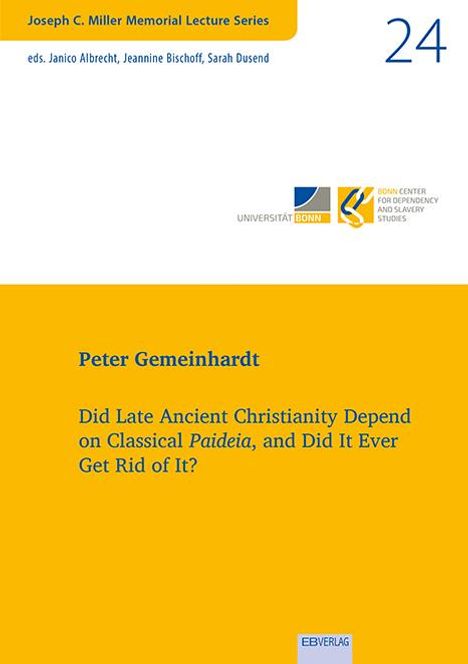Peter Gemeinhardt: Vol. 24: Did Late Ancient Christianity Depend on Classical Paideia, and Did It Ever Get Rid..., Kartoniert / Broschiert
Vol. 24: Did Late Ancient Christianity Depend on Classical Paideia, and Did It Ever Get Rid of It?
- Verlag:
- EB-Verlag, 01/2024
- Einband:
- Kartoniert / Broschiert
- Sprache:
- Englisch
- ISBN-13:
- 9783868934847
- Artikelnummer:
- 11973455
- Umfang:
- 86 Seiten
- Gewicht:
- 138 g
- Maße:
- 205 x 151 mm
- Stärke:
- 12 mm
- Erscheinungstermin:
- 15.1.2024
- Serie:
- JOSEPH C. MILLER MEMORIAL LECTURES SERIES - Band 24
- Hinweis
-
Achtung: Artikel ist nicht in deutscher Sprache!
Klappentext
Did Christianity in its beginnings depend on classical education, and was it ever able to free itself of this dependency? Christians were confronted with classical paideia, which comprised literate learning as well as social codes and the ideal of the true human being. Many Christian writers uttered their skepticism about paideia (due to the prominence of pagan Gods in school texts), but looking at educational practices opens up a different view. Christians made use of literate skills in memorializing the dead in inscriptions, writing down the life of saints, and preaching the Gospel in worship. Their dependency on educational competencies and values thus always entailed innovation and creativity as well as an ongoing interaction with contemporary religious cultures. If one distinguishes the levels of discourse and practice, it becomes clear that Christians felt no need to dispose of paideia. Instead, religious education was promoted for all members of the faith, regardless of age, sex, social standing, and also regardless of a person's status as a free citizen, freed person, or slave. One may even call late ancient Christianity, as is argued, a "Bildungsreligion" (a religion characterized by education).

